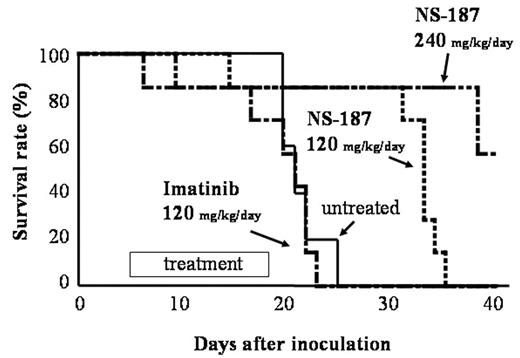Abstract
The penetration of imatinib mesylate (Gleevec™) into the central nervous system (CNS) is poor. Hence the CNS becomes a sanctuary site for patients who are on prolonged imatinib therapy. P-glycoprotein (P-gp) plays an important role in limiting the distribution of imatinib to the CNS, and it is well known that imatinib is a substrate of P-gp. We have recently identified a specific dual Bcr-Abl/Lyn inhibitor, NS-187, which can override imatinib-resistance. NS-187 was 25–55 and at least 10 times more potent than imatinib in vitro and in vivo, respectively. The purpose of this study was to investigate whether NS-187 can inhibit the growth of Ph+ leukemic cells in the CNS. In our preliminary pharmacokinetic study, the intracranial concentration of NS-187 was 10% of its serum concentration, suggesting the involvement in P-gp. To determine whether NS-187 is effluxed by P-gp, we examined the growth-inhibitory effects of NS-187 alone and in combination with a P-gp inhibitor, verapamil or cyclosporin A, on K562 cells and on a multidrug-resistant (MDR) K562/D1-9 cell line overexpressing P-gp. The K562/D1-9 cell line was 10 times more resistant to NS-187 than the parental K562 cell line, and P-gp inhibitors abolished this resistance, indicating that the action of NS-187, like that of imatinib, is affected by the P-gp-related MDR system. Even though NS-187 was found to be a substrate for P-gp, it inhibited the growth of K562/D1-9 cells at a concentration which could be achieved in the brain. we therefore tested the anti-tumor effects of NS-187 in murine CNS leukemia models. mice were inoculated into right cerebral ventricle with 1×105 BaF3/wt bcr-ablGFP cells (Balb/c-nu/nu mice) or 1×106 K562GFP cells (NOD/SCID mice). Five days after inoculation, mice were randomized into groups of 4 and orally administrated twice a day with vehicle, imatinib or NS-187 for 14 consecutive days. Sixteen days after inoculation, three mice from each group were sacrificed and their brains were examined under a fluorescent stereoscopic microscope. NS-187 inhibited the proliferation of leukemic cells in the brain, whereas imatinib did not. Moreover, NS-187 significantly prolonged the survival of the mice in a dose-dependent manner in both murine models compared with imatinib (Figure). In conclusion, NS-187 can inhibit Ph+ leukemic cell growth in the CNS in spite of efflux of the compound by P-gp.
Author notes
Corresponding author


This feature is available to Subscribers Only
Sign In or Create an Account Close Modal